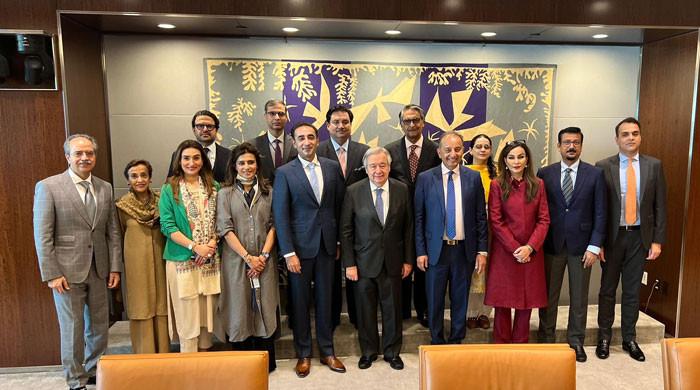- Bilawal hands UN chief Guterres letter from PM Shehbaz.
- Calls on UN chief to play proactive role for peace in South Asia.
- Seeks UN help for Pakistan-India dialogue on Kashmir dispute.
UNITED NATIONS: Pakistan’s former Foreign Minister and Chairman of the Pakistan Peoples Party (PPP), Bilawal Bhutto Zardari, has urged the United Nations to take an active role in easing tensions between Pakistan and India and help restore the Indus Waters Treaty, which he said had been arbitrarily suspended by New Delhi.
The former foreign minister, along with a nine-member high-level parliamentary delegation, is currently in New York, US, on a two-day visit to present Pakistan’s stance on the recent military confrontation with India and to challenge New Delhi’s narrative at the international level.
Members of the parliamentary delegation include, Hina Rabbani Khar, Sherry Rehman, Dr Musadik Malik, Khurram Dastgir Khan, Jalil Abbas Jilani, Tehmina Janjua, Bushra Anjum Butt and Syed Faisal Subzwari.
During a high-level meeting with UN Secretary-General António Guterres at the UN Headquarters in New York, 36-year-old politician called for urgent international efforts to prevent further escalation in South Asia. He said India’s recent military provocations and baseless accusations following the Pahalgam attack in Indian illegally occupied Jammu and Kashmir (IIOJK) on April 22 risk plunging the region into deeper instability.
Bilawal, who is leading the parliamentary delegation from Pakistan, handed over a letter from the Prime Minister Shehbaz Sharif to Guterres. The premier’s letter expressed Pakistan’s concerns about India’s recent actions, which include cross-border attacks and damage to civilian infrastructure. He also criticised India’s decision to suspend the Indus Waters Treaty, calling it a form of “water war” being imposed on Pakistan.
He urged the Secretary-General to use his good offices to help defuse tensions, restore the normal functioning of the Indus Waters Treaty, and promote a comprehensive dialogue between Pakistan and India —particularly on the Jammu and Kashmir dispute, which remains central to ensuring lasting peace in South Asia.
He stressed that the resolution of the Kashmir dispute was an unfinished agenda of the United Nations.
“The people of South Asia deserve peace, not war,” he said, warning that India was attempting to create a dangerous “new normal” of impunity and aggression.
The former Foreign Minister said that India used force and unilateral actions that violate international law and the UN Charter. “India’s conduct threatens the fragile peace in the region,” he said, while reaffirming Pakistan’s commitment to diplomacy and responsible behaviour.
Bilawal highlighted the humanitarian consequences of India’s decision to halt the implementation of the Indus Waters Treaty, which he said was putting millions of lives at risk. “This isn’t just about water,” he stressed. “It’s about survival.”
Bilawal also raised serious concerns over India setting a dangerous precedent by weaponising water, calling it a grave violation of international commitments and a threat to regional stability. He described the treaty as “a lifeline for 240 million Pakistanis”.
“The weaponisation of water cannot be tolerated,” he told the Secretary-General, urging the United Nations to help ensure the restoration and full implementation of the treaty.
Secretary-General Guterres welcomed Pakistan’s call for peace and reiterated the UN’s commitment to dialogue and the peaceful resolution of disputes. He said the United Nations remained fully engaged in supporting efforts aimed at de-escalation in South Asia.
Speaking to journalists in New York after the meeting, Bilawal launched a scathing attack on Indian Prime Minister Narendra Modi.
“Modi has become the butcher of Gujarat and Kashmir,” he said. “He now wants to trample the Sindh civilisation too.”
He also said Pakistan remained open to dialogue, but asserted that India was avoiding talks. “Pakistan is ready to talk, but India keeps running away,” he told reporters.
Addressing a press conference at the UN Headquarters earlier, the PPP chief urged the international community to push India towards a comprehensive dialogue with Pakistan.
“Ceasefire is a welcome first step but it is only a first step. I must emphasise that the global community today is less safe post this ceasefire… it’s simply because the threshold for full-blown military conflict between two nuclear-armed states has come down, it’s not gone up.”
He said India used Pahalgam attack as a pretext to launch attack inside Pakistan.
Following this terrorist attack in the IIOJK on April 22, PM Shehbaz offered publicly to India that Pakistan was ready to be part of any impartial international investigation into this attack.
“We did so because we were confident, our hands were clean and we had nothing to do with this terrorist attack.
“Indian government refused Pakistan’s offer and chose instead to conduct their illegal strikes. Pakistan only ever acted in self-defence, we never initiated any violence against India.

